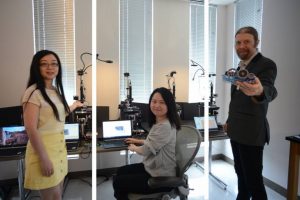
The following was originally published in The Hub.
Six projects have been selected to receive funding under the Johns Hopkins Digital Education and Learning Technology Acceleration grant program. Selected from a pool of 15 proposals, these DELTA award projects will receive up to $75,000 to enhance the university’s teaching and learning enterprise for a wide variety of populations, including Johns Hopkins graduates, undergraduates, faculty, patients, and the general public.
“We faced countless challenges as a result of the coronavirus pandemic this past year and a half, but we also learned a number of lessons, including the importance of innovative and creative uses of technology in education,” says Stephen Gange, executive vice provost for academic affairs at Johns Hopkins University. “We’re proud that our faculty have used the difficulties of the pandemic to launch new technology-based projects that will keep Johns Hopkins at the forefront of education.”
As of this year, DELTA has awarded 25 grants over four years, totaling more than $1.5 million in funding.
The 2021 DELTA grant recipients are described briefly below; more information, including abstracts of all the winning proposals, is available on the provost’s website.
A Platform for Remote Delivery of Hands-On Imaging Laboratories
Principal investigators Grace Jianan Gang, from the Whiting School of Engineering, and Joseph Webster Stayman, from the School of Medicine, focused their efforts this past year on developing an online platform for the Build-an-Imager class that would provide students with an interactive, hands-on experience even during remote instruction. The experience of hands-on experimentation—when students can actively model, design, and construct devices—is both important and highly desired by students, industry recruiters, and graduate admissions committees, the investigators note. With the DELTA grant, the team aims to further develop the remote delivery platform for Build-an-Imager, both as a standalone online course and as a component for the in-person version of the course to enrich students’ learning experience, among other goals.
Development and Evaluation of Open-Access Educational Media for Medical Trainees Studying MRI Physics
MRI physics is a notoriously challenging subject for radiology residents to master. Principal investigators Erin Gomez and Jeff Day, both of the School of Medicine, and Christopher Devers, of the School of Education, plan to create and assess different methods of media presentation illustrating the fundamentals of MRI physics to determine which method is most helpful for residents preparing for their certification exam. The educational resources created will be incorporated into a virtual radiology curriculum being led by Johns Hopkins faculty and hosted on a publicly accessible online platform available to medical students and residents everywhere.
High-Fidelity, Low-Latency, Networked Collaboration for Applied Music and Dance Education
Conservatories of music have been slow to adopt digital technologies that are potentially transformative to their traditional 19th-century approach to applied music instruction. Principal investigators Scott Metcalfe and Theron Feist, both from the Peabody Institute, will explore and expand the use of low-latency collaboration tools—which use high-speed internet across geographical locations—for teaching applied music and dance. The proposed project will allow the team to identify which tools work best for which artistic scenarios, run tests, provide recommendations and examples, and create easy-to-use “kits” for students and faculty who participate remotely in lessons, ensembles, and artistic co-creation.
JHU Online Excellence: A Multipronged Approach to Prepare Faculty for Excellence in Online Teaching and Learning
This cross-divisional effort will unite teaching and learning centers from across the university to create three pathways for sharing with faculty best practices in online teaching and learning. The three pathways entail a certificate program; a massive open online course, or MOOC; and a conference showcasing faculty, staff, and participants who demonstrate excellence in online teaching. The principal investigators are Olysha Magruder and Paul Huckett, both of the Whiting School of Engineering; James Diamond, of the School of Education; and Mike Reese, of the Sheridan Libraries.
Quest2Learn: A Gamification and Augmented Reality Approach to Advance Education
Principal investigators Eric Johnson and Jamie Young, both from the Krieger School of Arts and Sciences, and Scott Zeger, from the Bloomberg School of Public Health, aim to find new ways of teaching hands-on laboratory skills to students in a remote format. The team’s proposed solution is to develop nine robust laboratory modules leveraging augmented reality technology that will be included in the biochemistry laboratory course.
Two-Eyed Seeing: An Integrative Sciences Approach to Hybrid Learning Within Indigenous Health Courses at Hopkins
Etuaptmumk (“two-eyed seeing” in English) was first described by the Mi’kmaw elder Albert Marshall in 2004 as a metaphor for combining the best of both Western and Indigenous knowledge and approaches for the benefit of all. Principal investigator Allison Barlow, a faculty member in the Bloomberg School of Public Health and director of the Center for American Indian Health, will offer semiannual public health courses that teach core public health concepts through an Indigenous lens. The benefits of virtual classrooms are particularly pronounced among Indigenous students, who can maintain their connections to land and community while simultaneously pursuing public health and nursing training. The format also allows Indigenous students to bring their tribally diverse perspectives and knowledge to the university setting, enriching educational opportunities for the benefit of all.